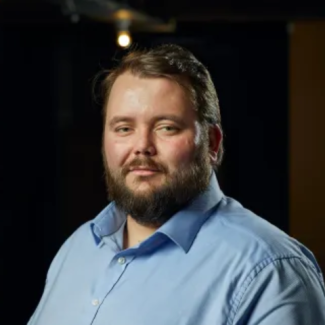As part of the Research Software Camps: Digital Skills for Research Technical Staff, we are reposting a series of case studies developed and originally published by MI TALENT. This series aims to highlight the many paths that may lead towards a technical career.

DR TOM KNOTT (AFHEA)
Senior Analyst
School of Geography, Geology and the Environment University of Leicester
- 2018-Present: Senior Analyst (specialising in XRF and SEM)
- 2015-2018: X-Ray fluorescence (XRF) technician
- 2015: Lecturer in Structural Geology (Fixed Term), University of Leicester
- 2014-2015: Honorary Research Associate, University of Leicester
- 2010-2014: PhD, University of Leicester
- 2009: European petrophysics consortium technician, IODP, University of Leicester
- 2005-2009: MGeol in Geology, University of Leicester
WHAT LED YOU TO BECOME A TECHNICIAN?
As a PhD student I found the support of technicians invaluable, particularly those with expertise into particular analytical techniques/methods. When it came to method development and analytical understanding the technicians became almost informal co-supervisors with respect to my training and development. When I became aware that one of my mentors was retiring, I was extremely interested in the post and applied as an X-Ray fluorescence (XRF) technician. I now strive to be as useful and supportive to users of the labs as my mentor was to me, and every day I find that my expertise grows. A technician never stops learning and developing their expertise, and it is an aspect of the job that I love.
HOW HAS YOUR CAREER PROGRESSED (WHERE ARE YOU NOW)?
I started my technical career as an XRF technician (see above) and spent the first 2/3 years developing my expertise in the physics and use of X-Rays in chemical analyses, particularly of geological materials. In 2017/18 I was then asked to translate my expertise to take the lead in our new state-or-the-art analytical SEM lab. This involved commissioning the new equipment and detectors etc, and at present I continue to devise and optimise methods to offer a high-standard of data and image acquisitions as applied to many ongoing geoscience and materials research projects. This was a step-up in responsibility and the challenges that came with it, but a progression I have never looked back from.
WHAT WERE THE MOST USEFUL ACTIVITIES THAT HELPED YOU PROGRESS IN YOUR CAREER?
The availability to engage with an ever growing network of hard- working and experienced technicians, both within and outside my host institution, has been extremely useful. This is facilitated by user groups in particular techniques or by presenting and discussing at international conferences. The advantage to my career development of being able to supplement self-learning with the experiences and knowledge of my peers cannot go understated.
WHAT ARE YOUR CAREER HIGHLIGHTS AND WHAT HAVE YOU ENJOYED THE MOST?
As above I particularly enjoyed the responsibility and challenge of setting up and leading the new SEM lab. However, a particular highlight for me came in 2018 when I was invited to join the ‘Discovering Excellence’ awards at the University of Leicester. I was invited by academics of the applied and environmental geology group to join them as they were nominated as finalists in the “Team of the year” category. This was in recognition of the analytical support I had provided for their research, and it was a gesture that I really appreciated.
DO YOU HAVE ANY FUTURE CAREER ASPIRATIONS AND IF SO WHAT ARE THEY?
I aspire to continue to grow my expertise and hope that this is recognised within my discipline. In particular I aim to seek professional registration as a Chartered Scientist (CSci) with the Institute of Science and Technology (IST). I am fortunate to be working in a career that I love, and I mostly aspire for this to continue for many more years.
WHAT CAREER ADVICE WOULD YOU GIVE TO YOUR YOUNGER SELF?
Never be afraid to admit something you don’t know and simultaneously never allow any learning opportunity to pass you by. As I have matured in age and confidence my passion for learning has heightened, and I would advise my younger self to find this passion as early as possible and to ask more questions free from the fear of embarrassment. If you don’t recognise gaps in your knowledge and seek to fill these then your expertise can’t grow to its full potential. Within any fulfilling career the learning never stops, so ensure you take full advantage.


